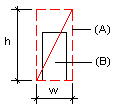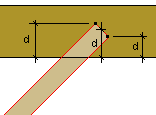Connect a Beam to a Log Wall
You can create a joint between a log wall and a beam connected to it. A beam pocket will be created to the log wall, also displayed in the log work drawing.
- Select Modeling | Connection |
 Joint
Joint  Profiles
Profiles
 Connection
Details. The browser is opened.
Connection
Details. The browser is opened. - Select the Log Walls folder in the browser.
- Select the 0001 Beam Pocket Joint joint.
- Select a log wall.
- Select the ends of the beams to be connected.
- Select Confirm. The Pocket in Log Wall dialog box opens.
- Select parameters for the log wall notching in the dialog box.
- Width - The default pocket width is the same as the beam width. If necessary, enter a new width (w) in the field.
- Height - The default height of the pocket is the same as the
beam height. If necessary, enter a new height (h) in the Height
field.

(A) = Pocket
(B) = Cross section
If the pocket dimensions differ from the dimensions of the beam cross section, the positioning of the beam in the pocket is determined by a reference point, the locating point. Select the locating point by selecting one of the radio buttons at the bottom of the dialog box. In the above figure, the locating point is the center point of the cross section's bottom
 .
. -
Pocket Depth at Reference Point - Enter the pocket depth (d) in
the field. If the beam is perpendicular to the wall face, the depth will be the same
regardless of the locating point. If the beam meets the wall obliquely, the depth
depends on the selected locating point.

- Choose one of the nine points on the rectangle drawn around the beam's cross section as the locating point of the pocket. The left and right side of the beam are defined by looking at the cross section from the end point of a volume, in the direction of its start point.
- If you have created a joint between the beam and the wall earlier, delete the old joint by selecting Delete in the message box.
Note:
- The beam pocket is also displayed in the log work drawing. The cross section of the beam itself will be displayed in the log work drawing only if the beam end crosses the center point of the log wall.
